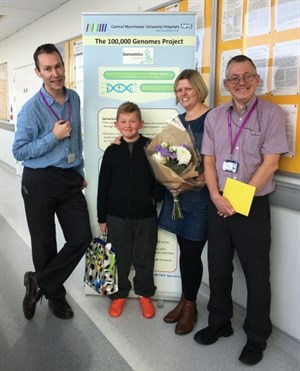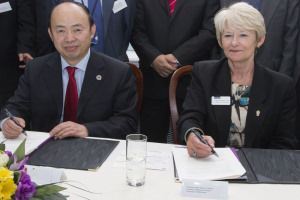£600K grant for congenital heart disease research
An early, success of the year-old DGEMBE genomic medicine collaboration, between Manchester and Cape Town universities, is the award of a £600K grant for combined work on congenital heart disease.
DGEMBE’s (Developing GEnomic Medicine BEtween Africa and the UK) principal aim is to develop a partnership between the two universities in rare disease research.
Leading the three-year initiative for The University of Manchester (UoM) are Professor Bernard Keavney, BHF Professor of Cardiovascular Medicine and Academic Lead for MAHSC Cardiovascular Domain, and Professor Graeme Black, Director of the Manchester Centre for Genomic Medicine.
Read more about the collaboration between Manchester and Cape Town universities on the MAHSC website.
1000th participant recruited for 100,000 genomes project

A lifelong patient of Saint Mary’s Hospital has become the 1000th participant in a ground-breaking project that is revolutionising the way those with rare genetic diseases are diagnosed and treated.
Ten year-old James Woods has joined the initiative which involves collecting and decoding 100,000 human genomes – complete sets of people’s genes – that will enable scientists and doctors to understand more about specific conditions.
The project has the potential to transform the future of healthcare. It could improve the prediction and prevention of disease, enable new and more precise diagnostic tests, and allow personalisation of drugs and other treatments to specific genetic variants.
Read more about the 1000th participant in the 100,000 genomes project on the CMFT website.
New Manchester-Beijing Healthcare Genomics postgraduate training course launched in China
A pioneering partnership between The University of Manchester and Peking University has resulted in the development of a formal post-graduate level training course in healthcare genomics for China-based doctors.

Genomic testing and precision medicine are playing increasingly important roles in diagnosing and treating conditions in clinical practice; however, the general level of knowledge of healthcare genomics is low among many medical practitioners – in the UK as well as China.
In the UK, clinical genetics has been a recognised medical specialty for over three decades with a formal training and career pathway for doctors who diagnose and manage families with genetic disorders. However in China, clinical genetics was only formally agreed as a specialist area of medicine this year, creating a need for formal training for doctors, genetic counsellors and clinical scientists to equip them with the necessary knowledge and skills to deliver patient care in this rapidly expanding field.
Read more about the new Healthcare Genomics training course on the University of Manchester website.
Reassurance for parents as cancer causing genetic condition risk lower than previously thought
The odds of children having a genetic condition which causes learning difficulties and tumours have been dramatically cut, thanks to genetic analysis led by The University of Manchester and Central Manchester University Hospitals NHS Foundation Trust.
Writing in the journal EBioMedicine, the researchers have identified the underlying genetic mutation which causes neurofibromatosis type 1 (NF1). By RNA testing 361 patients, the researchers were able show that the probability of a child having the severest ‘constitutional’ form of the condition after negative genetic testing is not 6 in 9, but 1 in 9.
Professor of Medical Genetics and Cancer Epidemiology at The University of Manchester and Saint Mary’s Hospital, Gareth Evans, led the study. He said: “The severe form of NF1 can be a terrible illness and to be able to reassure parents that it is less likely that their children will be diagnosed with it will take a significant weight off their shoulders.”
Read more about the NF1 study on the University of Manchester website.


